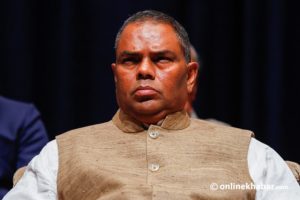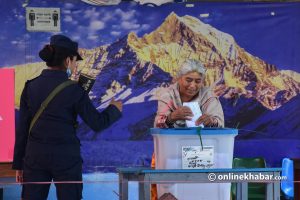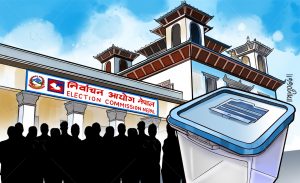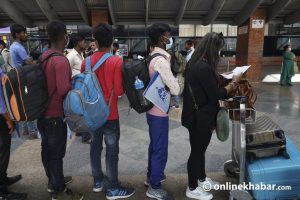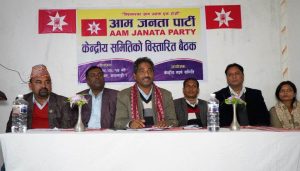
The Election Commission, on Saturday, wrote a letter to Setopati, a Nepali online news portal, ordering it to remove a news article written by the website about CPN-UML leader Agni Kharel’s son. The commission, in the letter, stated the news website was writing to defame the electoral candidate which went against the code of conduct for the November 20 elections.
This caused an uproar with people from all walks of life criticising the commission. Following that, the commission took a step back and decided to withdraw its decision and called it a technical error and tried to save itself.
On October 20, the commission asked CPN-Unified Socialists leader Madhav Kumar Nepal for clarification on why he was financially alluring voters claiming to give free visas to migrant workers. The commission was even planning to send a letter to the District Police Office, Rautahat, asking it to take action against Nepal for violating the code of conduct. But, the commission did not do so.
“We had readied everything, but the letter wasn’t sent,” says a source from the Election Commission. “We don’t know if the letter will be sent or not. If the letter is sent, the details are likely to be changed.”
Even though the police were given the right to arrest Nepal, the message was sent out too late.
On October 25, the commission ordered youth operating a Facebook group, No Not Again, to shut it down. The group was spreading a message about not voting for old leaders who had failed the country.
Once again, the decision sparked outrage as people claimed it went against the freedom of speech, after which the commission withdrew its decision yet again.
The commission wanted to shut down the group, but it ended up making it so popular that people from all around Nepal became a part of the group.
The Supreme Court also issued an interim order on the writ petition filed by senior advocate Dinesh Tripathi asking the commission to take no action against the group. After that, the commission’s statement changed.
“You can say no not again or elect again. But, please say it in a decent way that is all we care about,” said Chief Election Commissioner Dinesh Kumar Thapalia at an event on Sunday.
These examples show how the Election Commission is working before the elections. It has been taking decisions in haste not thinking about what their effects will be in the public eye. The officials do not even think if the decisions it takes will be implemented. As a result of that, it has been regularly taking back decisions it has made in recent weeks.
Tied hands

The code of conduct issued by the Election Commission states sitting ministers at the provincial and central levels cannot go to another constituency stating it is illegal to use state funds to promote an election campaign.
After the code of conduct was released, there was a lot of criticism from all political parties including the CPN-UML. After that, the commission could not stand firm on its decision and took a step back.
The code of conduct was then amended by the commission stating the ministers could go upon permission from the commission but could not use state resources.
After pressure from the ruling and opposition parties, the commission could do nothing but change its decisions, say sources at the commission.
When the Office of the Prime Minister and Council of Ministers sent a letter to the commission seeking permission to let Prime Minister Sher Bahadur Deuba visit Dadeldhura, it could not take a concrete decision. Since the letter came from the Prime Minister’s Office, officials from the commission deemed it a government visit. But after asking Deuba not to use or abuse any state resource, he was given permission to go.
The commission even questioned who would pay the charges for the helicopters used by the Deuba, Pushpa Kamal Dahal and Madhav Kumar Nepal when they went to Sukhet last month. It asked government bodies to send their answers but has not got one so far.
Deuba has once again used a Nepal Army helicopter to go to Dadeldhura. But, if the payment for the helicopter will be done by the government or Nepali Congress is unclear. Despite not getting clear answers from these parties, the commission continues to give them permission to do as they please.
If you can’t be convinced, get confused
In Setopati’s case, however, the Election Commission looked to have crossed its jurisdiction as the role of monitoring the media is given to the Press Council of Nepal. This decision was made by the commission itself.
The people in the commission were confused as to why the letter was sent as there were many questions pointed out within the commission itself. A government attorney was even sent back in regard to this case.
Meanwhile, a few weeks ago at a press conference at the commission, CEC Thapaliya said that vehicles would be able to run on voting day.
But, a meeting of security agencies a week later told Thapalia that there was no way that they would be able to provide security if vehicles were allowed to run on election day. Even officials from the Home Ministry were not in favour of allowing vehicles to run.
Now, the Election Commission plans on allowing vehicles in some parts of the country where there are no security threats. Even this is not sure as a final decision is yet to be made. All this has left Thapaliya redfaced as his statements were made without talking to anyone and in haste.
The commission had also stated that those who contested the local elections and did not submit their expense details would not be allowed to contest the forthcoming elections. These people would only be allowed if they submitted a fine.
The fine, according to the commission, could be submitted in any commission office and even on public holidays. The commission, which showed generosity for those who wanted to compete in the elections, initially arranged for fines in a very rude and harsh manner.
A few weeks ago, the commission made guidelines for submitting various documents during the nomination process. It was preparing to submit property details and make the details of the elected candidates public.
The commission made it voluntary after questions were raised about such provisions being against the Right to Privacy Act. Following this, the details would only be made public if the candidates wanted to.
The unorganised house

According to an Election Commission source, such incidents are happening due to a lack of coordination among election commissioners.
“Due to the delegation of authority, some of the work is done by some election commissioners alone, but later, they take it back after knowing it can’t be done,” says the source, adding most commissioners now do not want to talk about it, fearing criticism.
Former Election Commissioner Dolakh Bahadur Gurung says that the decisions made by the Election Commission, which has the constitutional obligation to conduct free and fair elections, should be universally accepted by all.
“Whatever the commission says, it should be done and implemented,” he says, “Since it will have a far-reaching impact on the fairness of the elections, restraint, patience and legal considerations should be considered while making every decision.”
He suggests that even though the shortcomings made by the Election Commission so far have not caused much damage, now as the elections are nearing, the commission should be even more sensitive.
This story was translated from the original Nepali version and edited for clarity and length.







